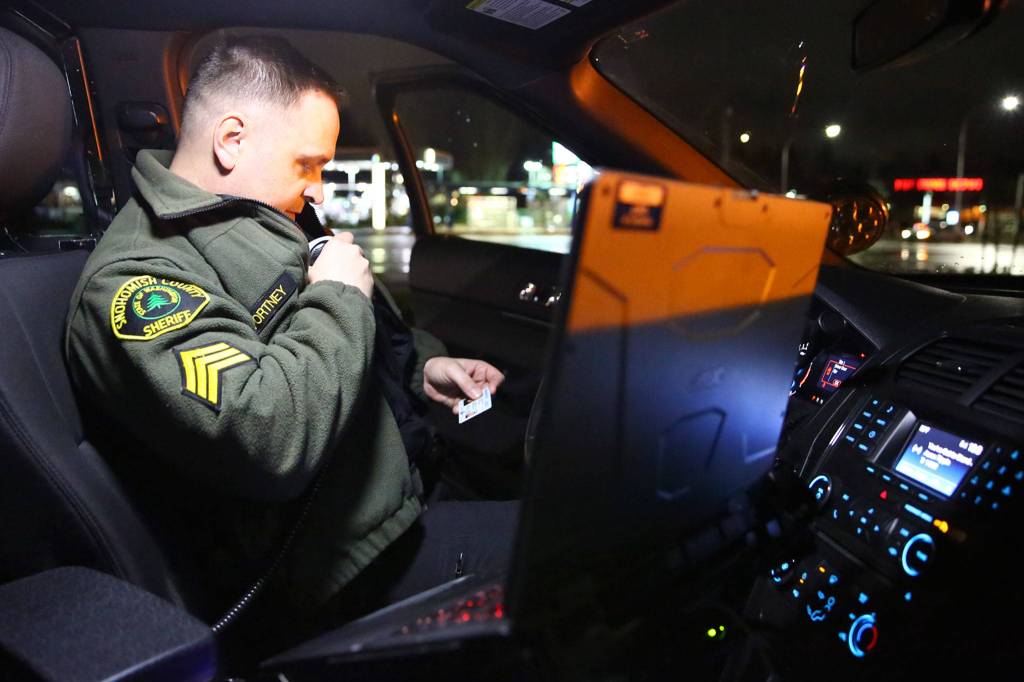No more ‘black boxes’ in patrol cars, new sheriff says
Published 1:30 am Sunday, January 19, 2020


EVERETT — Snohomish County’s largest law enforcement agency will no longer use an innovative tool to track how its patrol cars are being used.
Sheriff Adam Fortney said he ended the contract on New Year’s Day for telematics systems, or “black boxes,” that were installed in the department’s vehicles by the previous administration.
Fortney’s predecessor Ty Trenary implemented the program in 2017 to curb injuries and deaths from officer-related crashes. The devices captured information such as vehicle location, direction of travel, speed, braking and airbag deployment, as well as the use of emergency lights and seat belts.
The idea was to use the data to reinforce good driving habits and identify training issues.
Fortney said he could respect the message of safety, but he didn’t agree with the use of a system that gave deputies the feeling “Big Brother” was watching them.
“There was a negative connotation with the black boxes to the ground-level troops, every step of the way,” he said.
Fortney said he trusted his deputies to do their job, without that extra oversight.
“They go through an extensive background process to get hired,” he said in a December interview with The Daily Herald. “They go through the academy. We give them a badge and gun and … they have the authority to take people’s liberties away, which is a huge deal for me. I am going to trust them to drive their car.”
The sheriff’s office had 219 patrol cars equipped with the technology, and they cost about $12,000 per month to monitor, sheriff’s spokeswoman Shari Ireton said. They’ll remain installed, but they’ve effectively been turned off as a result of the contract ending, she said.
Fortney said he plans to divert the money toward new green jumpsuits for deputies, as a morale booster. They cost hundreds of dollars each.
Previously, deputies had to buy their own if they wanted the upgrade to a warmer, more comfortable outfit.
The telematics system was part of numerous traffic-related reforms undertaken by Trenary. In addition, the former sheriff tightened pursuit policy, formed a driving review board and increased safety training.
Driving is one of the riskiest parts of policing. Between 2007 and 2016, nearly 40 percent of officer deaths were the result of crashes, second only to gun violence, according to the National Institute for Occupational Safety and Health.
In Snohomish County, a grim reminder of driving’s dangers came in April 2015, when deputy John Sadro ran a stop sign and slammed into a pickup truck. A construction worker, pinned between the truck and a parked car, eventually lost his legs. The county settled a civil lawsuit for $14.3 million, and Sadro pleaded guilty to reckless driving and reckless endangerment, gross misdemeanors.
Trenary and his undersheriff, Rob Beidler, gave credit to the reforms when the sheriff’s office saw a decrease in the number of crashes and injuries involving deputies. The changes garnered national awards, too, from the Governors Highway Safety Association and Destination Zero, an initiative sponsored by the National Law Enforcement Officer Memorial Fund.
As union president, Fortney debated with sheriff’s office brass about how the data would be used. It was a subject he and the previous administration could never agree on.
This week Fortney also claimed the equipment didn’t always work. One time, a deputy crashed and airbags were deployed, but no alert was sent out from the telematics system, he said. The alert is supposed to be sent to sheriff’s supervisors so they can help coordinate a response.
The sheriff said he could see how the data could be useful in some instances. The cost wasn’t justified, though, he said.
“I don’t think the value in $12,000 a month is there whatsoever,” he said.
Previously, the former undersheriff, Beidler, said the telematics program could pay for itself. The data could be used to help reduce idle time by more than an hour per vehicle, per shift, and save on fuel and maintenance costs.
Zachariah Bryan: 425-339-3431; zbryan@heraldnet.com. Twitter: @zachariahtb.
This story has been modified to more accurately define the fleet of cars equipped with the telematics system.






